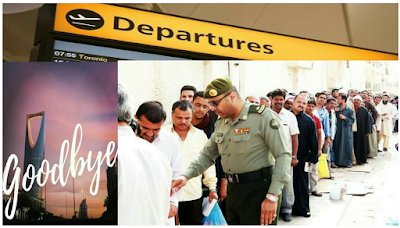Hundreds of thousands of expatriates have been leaving Saudi Arabia as the economy stagnates and the authorities impose more fees on foreign workers. Expatriates constitute about a third of the Saudi Arabia's total population. The collapse in oil prices has seen the biggest Arab economy losing much of its appeal to expats previously lured by petrodollars.
- Saudi Arabia is facing hiring crisis as more than 1,500 foreign workers leave every day since the last quarter of 2016, as companies struggle with slower business.
- The economic forecast is gloomy not only for expatriates but is likely to affect even some Saudi families, who may opt to remove their children from private schools and admit them into public schools to cut costs, look for cheaper housing with limited advantages, or move from villas to apartments.
- The nation shall witness a massive decline of 2.5 million foreigners by end of 2018. Unbearable costs of living erode incomes of expats, especially those who have dependents staying with them. Saudi has also decided to revoke subsidies on fuel, gas, bread, baby-milk, electricity, and medicine.
- Dependents fees for lower-income expatriates, as well as greater efforts to nationalize the workforce, make it less economically opportune for foreign workers.
- Bloomberg reports that the number of foreign workers declined by 6% to 10.2 million in the first three months of 2018, compared with a year ago. The cumulative drop over the five past quarters is about 700,000. Most job losses are in construction, trade and manufacturing.
- The jobless rate among Saudis aged 15 to 24 stood at 32.6% last year, according to the ILO.
- Unemployment among Saudis has risen to 12.9%, which further emphasizes the struggle to create jobs as the economy recovers from the “worst economic slowdown since the financial crisis in 2009". Under the National Transformation Programme, the government is aiming to cut the unemployment rate to 9% by 2020.
- Economists are expecting the rate of job losses for expats to remain elevated over the course of the year, as they attributed the forecast to rising fees, efforts to nationalize jobs and the “weak” economic backdrop. As the kingdom emerges from last year’s recession, job creation will likely lag behind the economic recovery.
- Crown Prince Mohammed Bin Salman (known as MBS) has sought to expedite the exodus of foreign workers by stepping up the process of so-called Saudization. He is making foreigners to pay fees for dependends, hiking up levies on companies employing non-Saudis and restricting the sectors in which they can work.
- Indian diaspora in Saudi Arabia was just 34,500 in 1975, increased to 351,000 in 1991, then 1,000,000 in 2000, 3,100,000 in 2015 and is 4,100,000 in 2017. Saudi Arabia is a major source of India's energy requirement as it imports one-fifth of crude oil requirement.
- In a bid to reduce unemployment, Saudi Arabia has imposed a restriction on the expatriates from working in 12 sectors. The new rules could potentially affect large numbers of people since about 12 million foreigners work in Saudi Arabia, doing many of the strenuous, dangerous and lower-paid jobs shunned by 20 million Saudi citizens.
- Authorities could relax some of the rules. According to Al Watan newspaper, the government may revise plans that ordered most retail businesses to replace all foreign workers with Saudis, reducing the percentage of nationals to 70%.
- The restriction is also likely to affect over 30 lakh Indians who live and work in Saudi Arabia. Several Indians employed in Saudi Arabia are likely to return back soon with the imposition the ‘dependent fee’ for expatriates from July 1, 2018, as they cannot afford to stay there any longer.
- Since Saudization is inescapable, it is bound to hurt both expats and Saudi Nationals temporarily. But it is hoped to put the economy back on track by 2020. With increased taxes and cost of living, expat savings become unattractive and voluntary migration to home countries is bound to happen. In order to make a sizable living, it seems expats will have to find newer pasture.
In order to provide jobs to half of their unemployed people, Saudi Arabia needs send back 25% expatriate workers i.e. 3 million. Since 4.1 million Indian workers constitute one-third of expatriates about one million Indians may lose their jobs and return to India in 1-2 years. The loss of foreign exchange remittances by them would be about $10 billion or Rs.67,000 crores, in a year. Apart from FE loss, India need to shell out more FE for crude oil purchases and provide livelihood opportunity to these returning Indians. However, all expatriates will not be replaced by Saudis as private firms lack innovation and they are addicted to cheap fuel prices and cheap labor.


No comments:
Post a Comment